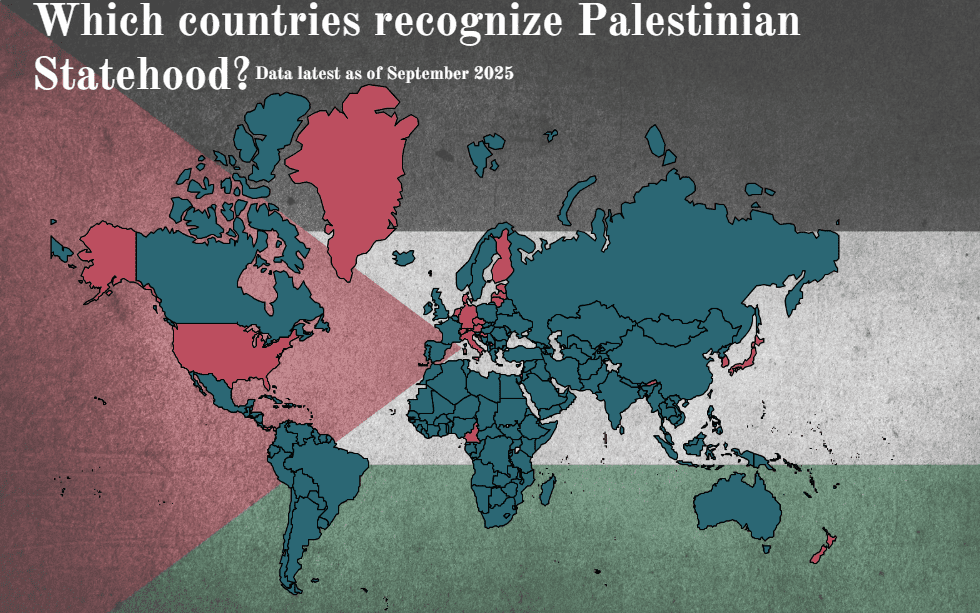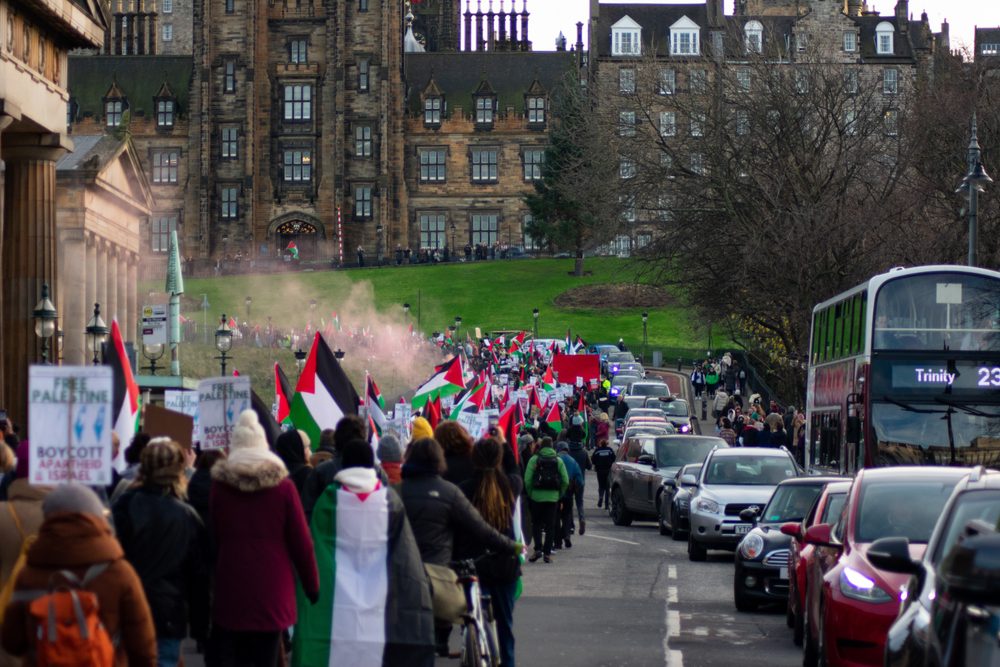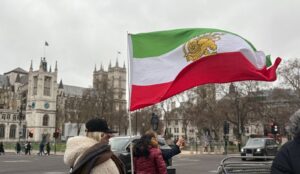In a co-ordinated diplomatic move, the United Kingdom, Canada, Australia, and Portugal have formally recognised the State of Palestine, a step aimed at bolstering efforts for a two-state solution amid the ongoing conflict in Gaza.
UK Prime Minister Sir Keir Starmer announced the decision on Sunday, describing it as essential to “revive the hope of peace” for both Palestinians and Israelis.
This brings the number of UN member states recognising Palestine to 156. A figure that is representative of over 80 per cent of the international community.
While supporters hail it as a vital push towards ending the violence that has claimed tens of thousands of lives since October 2023, critics, including Israeli officials, argue it rewards terrorism and undermines direct negotiations.
Starmer emphasised that the move is “not a reward for Hamas,” insisting the group has “no future, no role in government, no role in security.”
Palestinian Authority President Mahmoud Abbas welcomed the announcements, stating they pave the way for “the State of Palestine to live side by side with the State of Israel in security, peace and good neighbourliness.”
However, Israeli Prime Minister Benjamin Netanyahu condemned the decision, saying, “You are giving a huge reward to terrorism,” and warning that a Palestinian state “will not happen.”
The US, a key Israeli ally, expressed reservations, with officials noting it breaks from Washington’s stance. Yet, the wave of recognitions reflects growing frustration with the humanitarian crisis in Gaza, where reports of starvation and devastation have horrified the international community.
UK Deputy Prime Minister David Lammy acknowledged the limitations, saying, “Will this feed children? No, it won’t. That’s down to humanitarian aid.”
The recent wave of recognition by France, Andorra, Belgium, Luxembourg, Malta, and Monaco were c loosely followed by that of Britain, Canada and Australia’s.
This reflects widespread concern over the conflict in Gaza, with the Israeli Defence Forces (IDF,) having claimed 65,000 lives over the span of just under 2 years. However, what is the entire story?
1967 – The 6-day War & UN Res. 242
Following Israel’s participation in the 1956 Suez crisis, and the Palestinian refugee crisis that came about after British allotment of land to displaced Jews following WW2, a devastating 6-day war broke out in June 1967.
This saw Israeli settlers occupy the West Bank, The Gaza Strip, East Jerusalem, Sinai Peninsula and the Golan Heights. This caused the displacement of hundreds of thousands of Palestinians and prompted the United Nations to adopt resolution 242, which called for Israel’s withdrawal from “territories,” in exchange for lasting peace and a settlement for refugees. The vague language of “territories,” has fuelled much of the conflict since.
The 1970s – Palestinian Liberation Organization (PLO), and Observer Status
Fuelled by hopes of retaliation following the Arabic coalition’s loss to Israel in 1967, October 1973 saw the 19-day war between Israel, and an Arabic coalition led by Egypt and Syria. Dubbed the Yom Kippur War, after the suspicious day for those of the Jewish faith, the conflict claimed the lives of an estimated 8000 to 18,000 people, although that number is disputed based on the publication.
The aftermath of the war resulted in the UN’s adoption of Res. 3236, which affirmed Palestine’s right to self-govern, independence and return of the land that was occupied. This resolution also granted the PLO observer status in the United Nations.
Chairman Yasser Arafat addressed the assembly, declaring: “Today I have come bearing an olive branch and a freedom-fighter’s gun. Do not let the olive branch fall from my hand.”
This era saw rising support for the state of Palestine despite terrorist attacks like those of the 1972 Munich Olympic bombings that hindered diplomatic efforts and claimed the lives of 9 hostages and was carried out by Black September, a militant organization.
The 1980s and 90s – Independence, Intifadas & The Oslo Accords
The dawn of the decade saw Israel’s invasion of Lebanon in 1982 to eliminate PLO bases, which instigated the Sabra and Shatila massacres. The first Intifada erupted in December of 1987 against Israeli occupation, and captured the world’s attention till its eventual culmination in September of 1993.
With alliances made between various Palestinian organisations like the PLO, the Popular Front for Liberation of Palestine, Democratic Front of Palestine, Hamas, and Palestinian Islamic Jihad.
The end of the Intifada saw the PLO declare independence and enshrining Algiers as the centre of the Palestinian state, while hoping to achieve pre-1967 borders.
The 1990s saw the PLO’s support of Iraq during the reign of Saddam Hussein, further alienating their cause and straining diplomatic ties with the permanent members of the UNGA and UN Security Council.
The 1991 Madrid peace talks amidst the Intifada hoped to achieve lasting peace by enforcing UN resolutions 242 and 338.
It was closely followed by the 1993 Oslo Accords, where Israel and the PLO mutually recognised each other, which allowed for the Palestinian Authority to “self-govern in a limited capacity” in Gaza and the West Bank.
Arafat and Israeli PM Yitzhak Rabin shook hands at the White House with then US President Bill Clinton as the mediator. However, Rabin’s eventual assassination in 1995 saw negotiations falter.
The Noughties – 2 State Road Map & UN Upgrades
The dawn of the millennium saw the UN Security Council endorse a two-state solution in 2002. In 20023, they endorsed the “Quartet Road Map,” which outlined steps to statehood for Palestine and the “Arab Peace Initiative,” which offered normalization for withdrawal.
Israel eventually unilaterally disengaged in Gaza, which preceded THE 2006 Hamas election victory. By 2010, 122 countries had recognized a Palestinian state. 2011 saw UN voting Palestine into the organisation with membership with 120 supporters.
This also led to Palestine gaining UNESCO’s non-0member observer status in 2012, which enabled access to institutions like the International Criminal Court.
2010s and 20s – “The deal of the century!”, October 7th and Accusations of Genocide and Starvation
UN resolution 2334 in 2016 declared Israeli settlements on Palestinian land illegal. The Trump administration in the US brokered the “Deal of the Century,” which favoured Israel.
This era also brought with it, allegations of corruption, with some accusations levied against Israel for conducting a backdoor Oil deal with Emirati states as part of the 2021 Abraham accords.
The October 2023 Hamas attacks that claimed the lives of nearly 2000 lives in Israel and saw hundreds of hostages being taken, some being kept in Gaza to this day.
However, major political figures from various countries have called Israel’s response disproportionate, as it has claimed the lives of anywhere between 60,000 to 65,000 Palestinians.
The International Criminal Court, to which neither America nor Israel are members, ruled that the occupation was illegal in 2024, demanding immediate withdrawal.
Arrest warrants were issued for Israeli PM Benjamin Netanyahu, cabinet member Yoav Gallant and leaders of Hamas, Mohammed Diab Ibrahim Al-Masri, also known as Mohammed Deif.
Recognitions surged to 139 by 2020, then to 151 by September 21, 2025, with Norway, Spain, Ireland, and Slovenia in 2024.

Featured image via Sco_Bra / Shutterstock.




